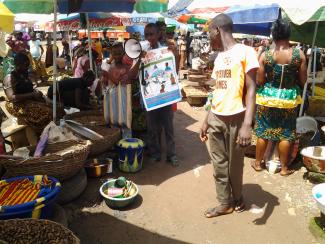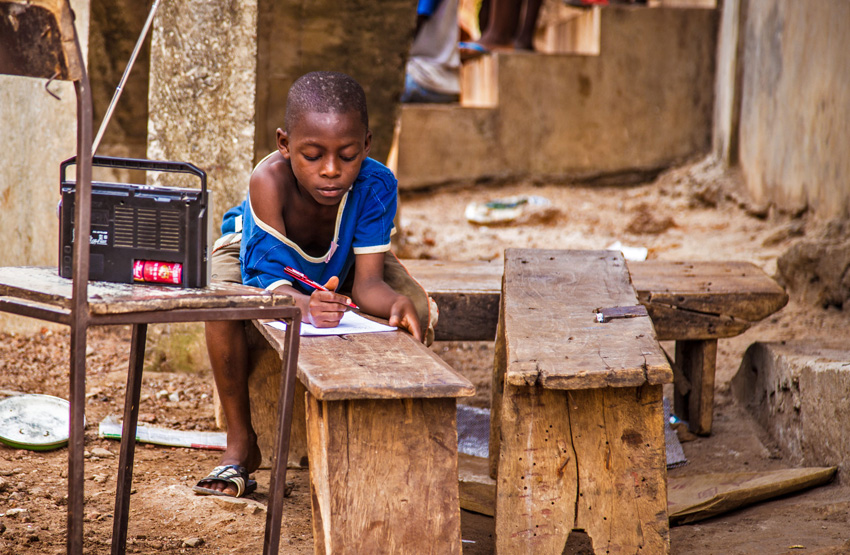Health care
Global responsibility

People in Sierra Leone are currently being told to wash their hands several times a day with water, soap and chlorine in order to protect themselves from Ebola. This advice is close to cynical, given that only half of the population has access to clean water.
Sierra Leone is about the size of Hesse, a German state. In colonial times, the British exploited the country; now local elites are doing so. Government bodies remain very weak one and a half decades after the end of a devastating civil war. The economy, which is entirely geared to commodity exports, has been growing fast in recent years due to fertile fields and natural resources such as diamonds, rutile and gold. The newly created wealth, however, was not used to improve public education and health services with an eye to guaranteeing everyone a life in dignity. Instead, wealth is distributed in personalised networks in which foreign financiers matter more than Sierra Leone’s masses. Private profits are prioritised over government revenues. President Ernest Koroma proudly claims to be running the country “like a private-sector company”.
Sierra Leone has never had a full-fledged health-care system. Today, there is one medical doctor per 30,000 inhabitants. As a result of policies imposed by the World Bank and the International Monetary Fund, health-sector wages have dropped below the poverty line. Hordes of health-care professionals have left the country.
The infrastructure is in a bad shape, and the poor lack any kind of protection. The health disaster did not start with the epidemic. It started decades ago. In the first four months of the epidemic, some 440 people died of Ebola – but more than 3000 were killed by Malaria, almost 900 by diarrhoeal illnesses and almost 800 by HIV/AIDS. Meningitis and tuberculosis were also more deadly than Ebola.
The vast majority of Sierra Leoneans have never experienced any kind of caring government. They do not trust the state agencies that are now sealing off entire districts, without providing enough food for the people inside. As a consequence, the resource-rich but socially deprived Province of Kono has witnessed deadly rioting.
The preconditions for raising awareness could hardly be worse. However, civil-society organisations that have been active at the grassroots level such as the Network Movement for Justice and Development (NMJD) have the advantage of enjoying people’s trust. For many weeks, helpers have been going from door to door. Interacting with community members, they want to dispel fear, distrust and fatalism. They explain why hiding sick relatives means to risk one’s own death, and they spread the information that those who have survived an Ebola infection are indeed cured. The helpers want to prevent stigmatisation, and they respectfully try to keep mourners from washing or hugging deceased family members.
The NMJD is raising political demands too. Real solidarity is needed now, not superficial aid. People must be put in a position to take their fate into their own hands. Sierra Leone needs social-welfare, education and health policies that serve the people, and that is affordable. Economic policies that serve the world market are plainly not enough.
International institutions and donor governments have great influence in Sierra Leone. This country depends on their support after the bloody civil war. Rich nations must not try to isolate themselves from West Africa’s crisis region. We urgently need something like an international health fund to enable all countries to run strong health-care services (see contribution by Lea Ferno on this matter). Humanity has the means, but its resources are not distributed equitably.
In Sierra Leone and its neighbours Guinea and Liberia, the needs of the people have always been neglected – by policymakers at national and international levels. That made the fast spread of Ebola possible. The living conditions in this part of the world are sickening – and that is nothing new.
Anne Jung is a health adviser with medico international in Frankfurt.
jung@medico.de
Joseph Pokawa is a programme director of Network Movement for Justice and Development (NMJD), a civil-society organisation, in Sierra Leone.
http://www.nmjd.org










